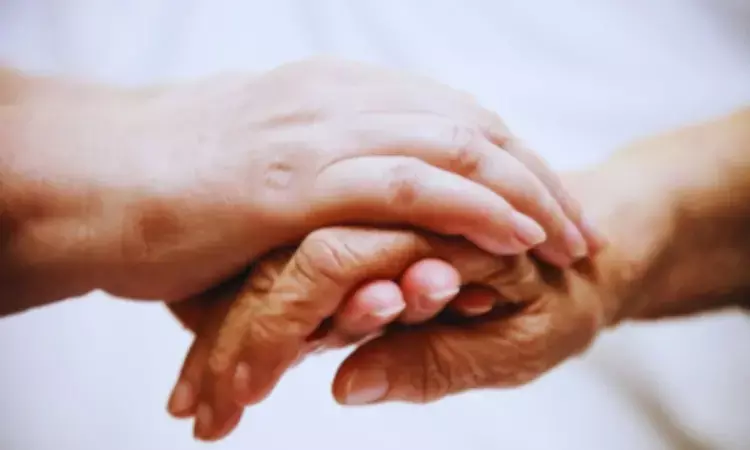- Home
- Medical news & Guidelines
- Anesthesiology
- Cardiology and CTVS
- Critical Care
- Dentistry
- Dermatology
- Diabetes and Endocrinology
- ENT
- Gastroenterology
- Medicine
- Nephrology
- Neurology
- Obstretics-Gynaecology
- Oncology
- Ophthalmology
- Orthopaedics
- Pediatrics-Neonatology
- Psychiatry
- Pulmonology
- Radiology
- Surgery
- Urology
- Laboratory Medicine
- Diet
- Nursing
- Paramedical
- Physiotherapy
- Health news
- Fact Check
- Bone Health Fact Check
- Brain Health Fact Check
- Cancer Related Fact Check
- Child Care Fact Check
- Dental and oral health fact check
- Diabetes and metabolic health fact check
- Diet and Nutrition Fact Check
- Eye and ENT Care Fact Check
- Fitness fact check
- Gut health fact check
- Heart health fact check
- Kidney health fact check
- Medical education fact check
- Men's health fact check
- Respiratory fact check
- Skin and hair care fact check
- Vaccine and Immunization fact check
- Women's health fact check
- AYUSH
- State News
- Andaman and Nicobar Islands
- Andhra Pradesh
- Arunachal Pradesh
- Assam
- Bihar
- Chandigarh
- Chattisgarh
- Dadra and Nagar Haveli
- Daman and Diu
- Delhi
- Goa
- Gujarat
- Haryana
- Himachal Pradesh
- Jammu & Kashmir
- Jharkhand
- Karnataka
- Kerala
- Ladakh
- Lakshadweep
- Madhya Pradesh
- Maharashtra
- Manipur
- Meghalaya
- Mizoram
- Nagaland
- Odisha
- Puducherry
- Punjab
- Rajasthan
- Sikkim
- Tamil Nadu
- Telangana
- Tripura
- Uttar Pradesh
- Uttrakhand
- West Bengal
- Medical Education
- Industry
Early psychological therapy effective against depression and anxiety in stroke survivors: study

A new study published in the Nature Mental Health revealed that psychological therapy significantly improves mental health outcomes for stroke survivors, particularly when treatment is initiated early.
According to this NHS Talking Therapies program in England, more than one in 3 stroke survivors struggle with depression or anxiety. However, psychological support is often underutilized or delayed in this population. The research analyzed real-world clinical data from 7,597 patients who had previously suffered a stroke, and offers the strongest evidence to date that timely mental health intervention is crucial in post-stroke recovery.
The study found that stroke survivors who received psychological therapy experienced moderate reductions in depressive symptoms and substantial reductions in anxiety. These results reinforce the importance of mental health support as part of stroke rehabilitation.
The patients who began therapy within 6 months of their stroke were far more likely to experience reliable recovery from their mental health symptoms than those who started treatment a year or more after the event. This trend held true even when controlling for variables such as age, gender, socioeconomic status, and baseline severity of symptoms.
This research compared stroke survivors to a matched control group of patients without a stroke history. While both groups showed improvement following therapy, stroke survivors were less likely to achieve reliable recovery and more likely to experience worsening symptoms. However, this disparity narrowed when physical comorbidities were taken into account.
Stroke survivors were less likely to achieve what the study defined as “reliable recovery” in their symptoms of depression or anxiety compared to non-stroke patients, suggesting a unique vulnerability in this group. Also, there was a slightly higher risk of “reliable deterioration” (a significant worsening of symptoms) in stroke survivors, underlining the need for close monitoring.
The patients referred within 6 months of stroke had better recovery rates and lower deterioration than those referred after a year. When adjusting for physical health conditions, the gap in outcomes between stroke and non-stroke patients narrowed, highlighting the complex interplay between physical and mental health.
These findings demonstrates the real-world effectiveness of psychological therapies for stroke survivors and the critical importance of early referral. With mental health proving to be a vital component of recovery, timely therapy could be the difference between long-term struggle and meaningful improvement in quality of life in stroke survivors.
Source:
Suh, J. W., Bell, V., Buckman, J. E. J., El Baou, C., Desai, R., Fearn, C., Marchant, N. L., Richards, M., Cooper, C., Pilling, S., John, A., Stott, J., & Saunders, R. (2025). A record-linkage study of post-stroke primary care psychological therapy effectiveness in England. Nature Mental Health, 3(6), 626–635. https://doi.org/10.1038/s44220-025-00429-z
Neuroscience Masters graduate
Jacinthlyn Sylvia, a Neuroscience Master's graduate from Chennai has worked extensively in deciphering the neurobiology of cognition and motor control in aging. She also has spread-out exposure to Neurosurgery from her Bachelor’s. She is currently involved in active Neuro-Oncology research. She is an upcoming neuroscientist with a fiery passion for writing. Her news cover at Medical Dialogues feature recent discoveries and updates from the healthcare and biomedical research fields. She can be reached at editorial@medicaldialogues.in
Dr Kamal Kant Kohli-MBBS, DTCD- a chest specialist with more than 30 years of practice and a flair for writing clinical articles, Dr Kamal Kant Kohli joined Medical Dialogues as a Chief Editor of Medical News. Besides writing articles, as an editor, he proofreads and verifies all the medical content published on Medical Dialogues including those coming from journals, studies,medical conferences,guidelines etc. Email: drkohli@medicaldialogues.in. Contact no. 011-43720751


